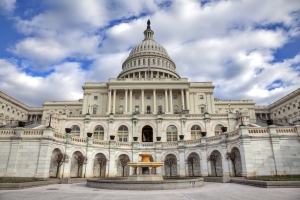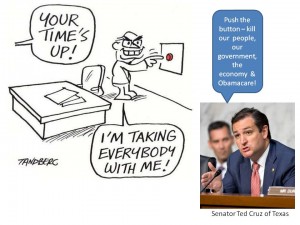By: Michael Tuosto
 The modern American liberal has drifted far from the true liberal ideas that The Enlightenment gave birth to. Individual liberty was the corner stone of the original liberal ideology. This type of liberty is made possible only through self-reliance and in the absence of a big, intrusive government. To their credit many modern American liberals have begun calling themselves progressive. I always found this term ironic because the expansion of government, which they promote, can only lead to a sort of regression back to the days of dependency on government. Be that as it may, I am not one who believes the majority of these progressives have malignant intentions. They simply don’t view government as a threat to freedom. When it is doing anything but protecting individual liberty, that is exactly how I view it.
The modern American liberal has drifted far from the true liberal ideas that The Enlightenment gave birth to. Individual liberty was the corner stone of the original liberal ideology. This type of liberty is made possible only through self-reliance and in the absence of a big, intrusive government. To their credit many modern American liberals have begun calling themselves progressive. I always found this term ironic because the expansion of government, which they promote, can only lead to a sort of regression back to the days of dependency on government. Be that as it may, I am not one who believes the majority of these progressives have malignant intentions. They simply don’t view government as a threat to freedom. When it is doing anything but protecting individual liberty, that is exactly how I view it.
I have a theory that the emerging view of freedom among progressives and much of the American population is a sort of Marxist view of freedom. I don’t say this with any intention to have this view be dismissed as an evil Communist plot. Unlike those who throw words like Stalin around in order to diminish the Manifesto’s contribution to philosophy, I have actually read it. One of the main points in Karl Marx’s and Friedrich Engels’ Manifesto, in my view at least, is the idea that enough wealth exists in the world to supply everyone with basic human necessities. All the workers have to do is unite and take it. This idea is consistent with one of FDR’s four freedoms, freedom from want. I believe this understanding of freedom being advocated by progressives and being accepted by many in the masses is a freedom both Marx and FDR envisioned. This is a freedom that is based on not having to worry about the burden of earning; it is freedom from material grafitication and excessiveness, so to speak.
Those supporting universal healthcare in today’s America subscribe to this mentality. They believe people should be guaranteed healthcare because it is a basic human necessity. Shelter, food, water, and leisure are also some basic human necessities and there are government programs already in place to help many fulfill these needs. Well, sex is also a basic human necessity. Is there a progressive plan to ensure everyone is provided with a sexual partner? I’m starting to like this ideology. I’ll never have to get off the couch again!
I don’t mean to trivialize the healthcare debate, but instead make a broader philosophical point about the role of government. As I acknowledge that the overwhelming majority of progressives have good intentions, I would expect them to extend me that same courtesy. The ideological divide in this country is fueled by ignorant conspiracy theories about “the other side”. Let me be the first to say that I don’t believe progressives want government control over individuals and complete government dependency; I simply believe that the policies they advocate for will lead to these two evils. I know people like to pretend that this is a democracy and that our government is truly just an extension of we the people. It isn’t though, this is a republic and people must stay skeptical of policies that concentrate our wealth in the hands of these politicians.
Government does not produce anything. The only way the State provides for its people in which they do not earn for themselves, is by stealing from others. It is part of my ideology to reject the idea that the State has a moral authority that individuals do not. For me, if an individual cannot steal, then neither can the government. Obviously those who are comfortable with the death penalty and redistribution of wealth disagree with me on this. Well, lets just agree to disagree. Individuals do produce wealth however, and when the free market is allowed to thrive, human necessities become cheap and affordable due to competition and the wonders of supply and demand. It is the absence of a free market approach in our healthcare system that does not allow these beautiful phenomena to take place.
For those who think I simply support millionaires’ and billionaires’ right to make profits, I’d ask them to consider how much more the big government policies of our State have benefited the wealthy than the free market ever would have. Just because George W. Bush began the bailouts, doesn’t make it any less of a big government policy.
To What am I Entitled?,




tsudo pop
15 Jun 2011I really don’t know where to begin. I don’t know what Wikipedia article you read, but it was really wrong. Liberalism is a form of government that proposes a government that works for the best interests of the people, to which I’m not saying happens all the time. But to suppose that the free market, or private sector, ensures peoples’ freedom, is a gross distortion of facts and history. There is a reason why economists call their study the ‘dismal science’. It’s a perpetual mind-fuck that is driven by incentives and wants and blind obedience to the almighty dollar that have consistently failed.
While the root word of liberalism is liberty, the two don’t inherently mean the same thing, and to assume so is a tragic simplification of the former. Liberalism, as John Dewey, as I suggest you read rather than Marx for definitions of modern-day liberalism, defines it, is a government that acts in such a manner that is for a majority of the people and their benefit–which thus means it is always restructuring itself to fit the needs of a generation’s people. The free market doesn’t offer such freedom. The free market offers you money, which you can spend on things, but consumerism is not necessarily a form of freedom, and can be contested as actually being a form of slavery.
Adam Smith, the godfather of supply-and-demand theory, repeatedly warned against the private sector gaining too much power over governmental institutions in fear that pecuniary elitism would take hold as a regime coalition, which it surely has as of this century.
Granted, politicians have strayed from their duties of protecting the rights of its people, but that’s only because they have been giving more freedom and more rights to that of the free market, which you so extol. Look at the politicians pockets? Why not look at these CEOs? These select .01% off the population that own upwards of 80% of the wealth? It seems like your system is a lot more corrupt than the one you condemn.
What you are talking about with a shift in classical liberalism compared to modern-day liberalism, then yes, you are correct in stating that it has changed. Then again, so has almost every social institution, but hey, let’s stick with liberalism. Classical liberalism proposed that the individual was given and inherent, and thus all his/her rights were inalienable, inherent, and given. But, as history later showed, there was a problem in that logic. Certain institutions easily took away that supposedly ‘inherent’ and ‘given’ right to be an individual, like slavery, industrialism, imperialism, National Socialism, fascism, authoritarianism, dictatorships, consumerism, etc. etc. That naturally brought about the question of what the individual was in this new century that was constantly redefining its definition of the individual. The most prominent definition came from John Dewey’s Liberalism and Social Action, in which he disputed inherency as passive and rather favored a more active participation of the individual in social institutions to guarantee its liberty. And so, liberty then becomes a reflective exercise in the community to ensure the individual can exist without impediment. That’s the exact opposite of a laissez-faire system that proposes this New Age Invisible Hand to guide people liberty through pecuniary incentives in order to act.
The reason that the free market should be more limited than the government is that the government can be recycled out and be voted back in, always ensuring that even if corruption exists, it will not last forever so long as the people participate in social action–which, as of today, happens less and less each year (which is sad). But the free market runs itself based primarily on stockholder wants, i.e. money, which can come at a significant cost to society as Walmart, CocaCola, Home Depot, Koch Industries, BP and many others have shown. The free market has no effective system to ensure that society, and I mean all of society, will not fall victim to their corruption.
Please educate yourself rather than make wild assumptions based on the rhetoric of Bill O’Reilly and pundits such as he.